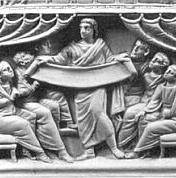 “Why would twenty-first century Christians—who can read the Bible for themselves and attend Bible-believing churches—need to study Church History?”
“Why would twenty-first century Christians—who can read the Bible for themselves and attend Bible-believing churches—need to study Church History?”
9. Learning church history will clarify our interpretation of Scripture.
Just get two or three believers together for a Bible study and you soon realize that not everybody interprets the Bible exactly the same way. Sometimes they come to completely opposite conclusions. Other times they emphasize certain passages or doctrines more than others. Even when we follow the same rules of methodical Bible study or the principles of exegesis, we sometimes come up with different interpretations.
By looking back over church history, we can gain a perspective that will aid (not replace!) our reading of Scripture in two ways:
First, early testimony can provide added insight into the historical and theological context within which the New Testament itself was written and read. By “early” I mean the writings of the period overlapping with and immediately following the New Testament apostles and prophets themselves, between about AD 50 and 150. Though these accounts can’t be treated as authoritative Scripture, these early authors’ interpretations, doctrines, and practices open a window into the teachings of the apostles themselves.
It’s reasonable to conclude, for example, that Polycarp, a disciple of the apostle John, reflects much of John’s theology and practice in his own letter to the church in Philippi, which he wrote around AD 110 . . . just a couple of decades or so after John wrote his Gospel, epistles, and Revelation. In fact, Irenaeus of Lyons, a disciple of Polycarp, wrote around AD 180: “For how should it be if the apostles themselves had not left us writings? Would it not be necessary . . . to follow the course of the tradition which they handed down to those whom they did commit the Churches?” (Irenaeus, Against Heresies, 3.4.1). That is, many people were still alive throughout the second century who had the authentic words and theology of the original apostles and prophets still ringing in their ears. Although these earliest testimonies cannot be adopted uncritically, we can’t afford to completely ignore these writings as tools to help us properly interpret the apostles’ writings in their actual historical theological contexts.
Second, enduring tradition refers to those things that continue to be retained, reaffirmed, or restored in every generation of Christian history. Christ promised that he would never leave us, even to the end of the age (Matt. 28:20). He also promised that the gates of hell would not prevail against the church (Matt. 16:18). We know that he is ever-present with the church by means of the person of the Holy Spirit (John 14:16–18). Also, through the Holy Spirit the ascended Christ has gifted the church with not only first-generation apostles and prophets, but also enduring leaders called evangelists, pastors, and teachers (Eph. 4:11). The implication is that the truth-telling and life-giving ministry of the Holy Spirit will prevail in the church against the hellish attacks of Satan. So, if individual leaders, whole churches, or even most of the universal Christian church were to stray from the fundamental saving doctrines of the faith, the Holy Spirit would eventually shepherd the church back to a proclamation of the gospel in its purity. So, by studying church history, we are studying the “further acts of the Holy Spirit since Acts 28.”
Through church history we can discern the core doctrines the Holy Spirit continued to emphasize throughout the ages. When we become aware of these central, unifying core truths of the faith that have endured throughout history, we can be constantly reminded of the boundaries of orthodoxy—the rules within which believers have freedom to responsibly interpret Scripture, but outside of which believers must never stray. As Vincent of Lérins wrote in AD 434, “All possible care must be taken, that we hold that faith which has been believed everywhere, always, by all.” Looking back will help safeguard evangelical interpreters of the Bible from either denying central dogmas of the Christian faith or from centralizing opinions about what the Bible says. In other words, the core teachings of the Christian faith must never change. The faith has been once for all delivered to the saints (Jude 3). But in order for evangelicals to know the boundaries of their biblical interpretations, they must know which biblical doctrines are central. Looking back at the history of how the Spirit corrected, disciplined, pruned, and grew the church in its doctrinal understanding will help believers clarify their interpretation of Scripture.
